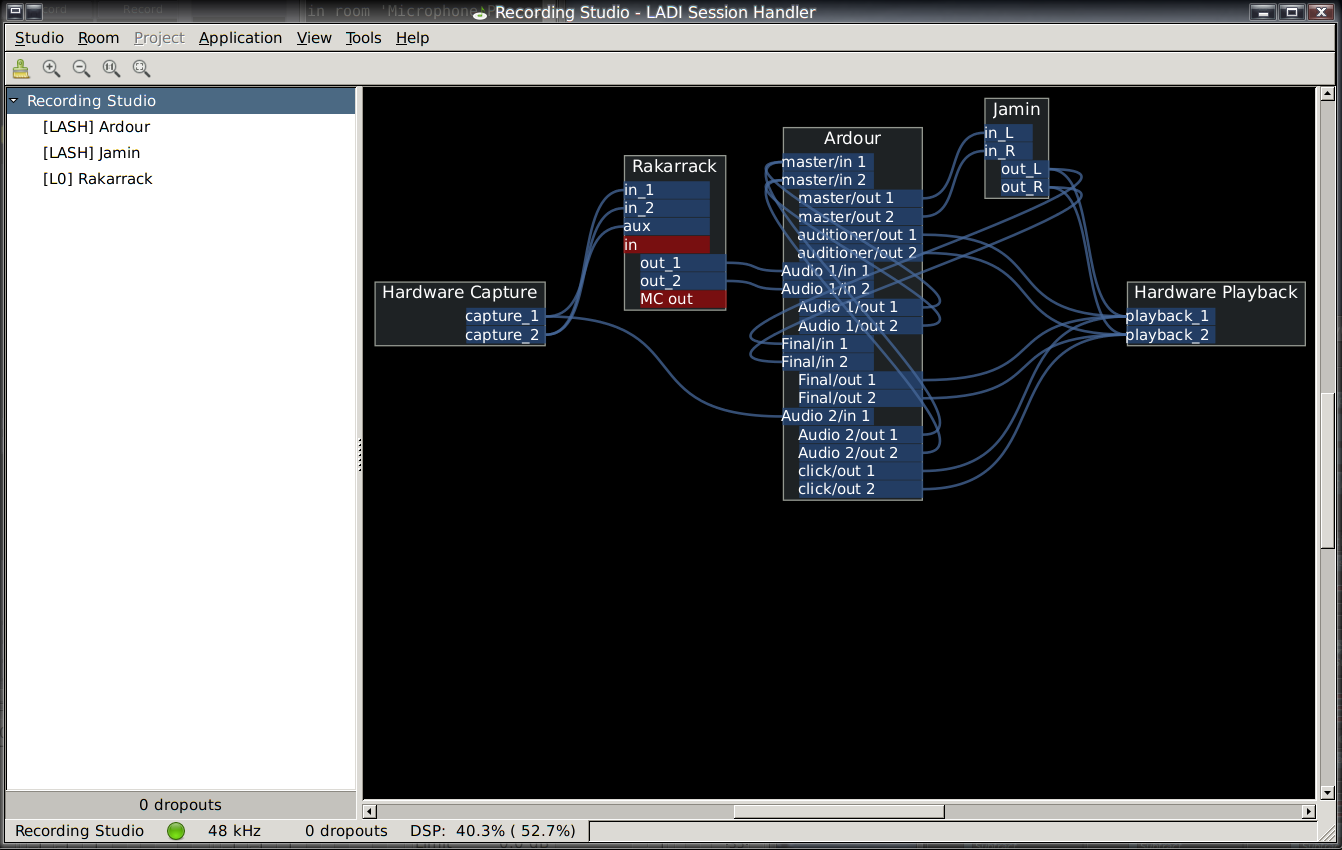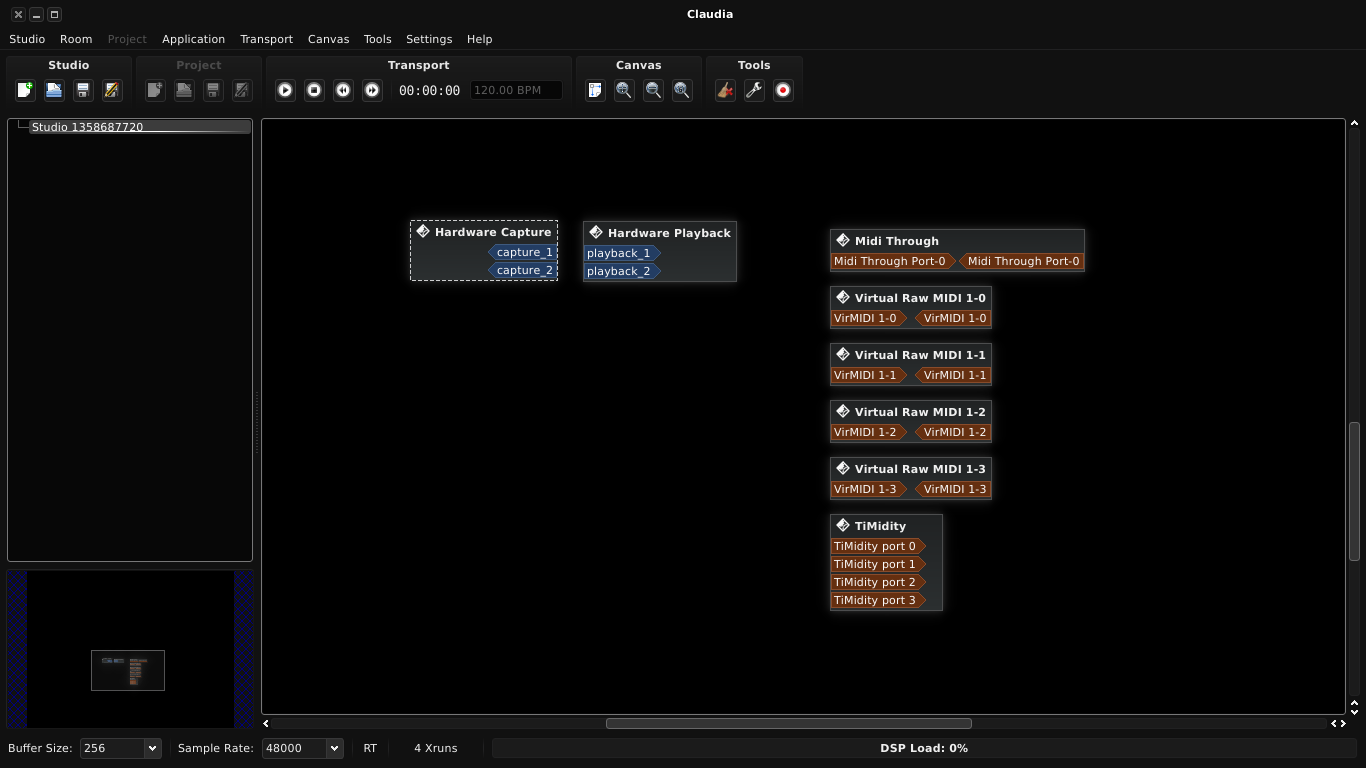LADI Session Handler or simply ladish is a session management system for JACK applications on GNU/Linux. Its aim is to allow you to have many different audio programs running at once, to save their setup, close them down and then easily reload the setup at some other time. ladish doesn't deal with any kind of audio or MIDI data itself; it just runs programs, deals with saving/loading (arbitrary) data and connects JACK ports together.
Features:
-
Save and restore sets of JACK (audio and MIDI) enabled applications.
-
Subgraph management, the Studio & Rooms concept. Provide JACK clients with virtual hardware ports, so projects can be transferred (or backups restored) between computers running different hardware and backups. Allows to decouple projects (loaded in a Room) from hardware audio IO used in particular Studio. A virtual jack-multicore cable connects room IO ports to hardware IO ports.
-
Don’t require session handling library to be used. There is no need of such library for restoring connections between JACK clients. LADISH is able to manage JACK apps that don't link to liblash (or liblo). This is known as L0 (level zero) in LADISH.
-
Seamless handling of apps that use ALSA sequencer ports. This is achieved by use of a2jmidid and libalsapid.so. The former creates jack-midi ports for the alsa sequencer ones. The latter reports the alsa application process ID to ladishd, so that ladishd can associate the a2jmidid-created ports with application.
-
Flow canvas based GUI. Positions of elements on the canvas are saved/restored.
-
Allow clients to use external storage to save their state. This includes storing internal state to non-filesystem place like memory of a hardware synth. This also includes storing client internal state (client project data) in a way that is not directly bound to ladish project.
Among project future goals are:
-
Support for pipewire setups (in addition to JACK1 and JACK2)
-
List of available JACK applications.
-
Hierarchical and/or tag-based organization of projects.
-
Support for applications that create more than one jack client per process
-
Support for applications that create use more than one jack client process
-
Non Session Manager protocol support
-
New Session Manager protocol support
-
Collaborate with the X11 window manager so window properties like window position, virtual desktop and screen (multimonitor) are saved/restored.
-
Distributed studio - network connected computers. Netjack configuration is part of the studio and thus is saved/restored. Saving/restoring state in multi-machine network
-
Ability to move entire sessions between computers, or post sessions on the Internet for download. Import/export operations, as opposed to save/load. Save/load operate in current system and may cause saving data outside of project itself (external storage). Import/export uses/produces "tarball" suitable for transferring session data over network to other computer or storing it in a backup archive.
-
Session versioning via Git
Tarballs:
GIT repositories:
-
Upstream development GIT repository
Self-hosted upstream -
Primary backup GIT repository at github.com
Cloud hosted -
Secondary backup GIT repository at repo.or.cz
Cloud hosted
LADI Session Handler was forked from the D-Bus-ified LASH project. Things that LADISH can do but LASH (D-Bus-ified or not) cannot:
-
Subgraph management, the Studio & Rooms concept. Allows to decouple projects (loaded in a Room) from hardware audio IO used in particular Studio. A virtual jack-multicore cable connects room IO ports to hardware IO ports.
-
Don’t require session handling library to be used. There is no need of such library for restoring connections between JACK clients. LADISH is able to manage JACK apps that don't link to liblash (or liblo). This is known as L0 (level zero) in LADISH.
-
Seamless handling of apps that use ALSA sequencer ports. This is achieved by use of a2jmidid and libalsapid.so. The former creates jack-midi ports for the alsa sequencer ones. The latter reports the alsa application process ID to ladishd, so that ladishd can associate the a2jmidid-created ports with application.
See also:
For related discussions, you are invited to join Libera.Chat channel #ladi

